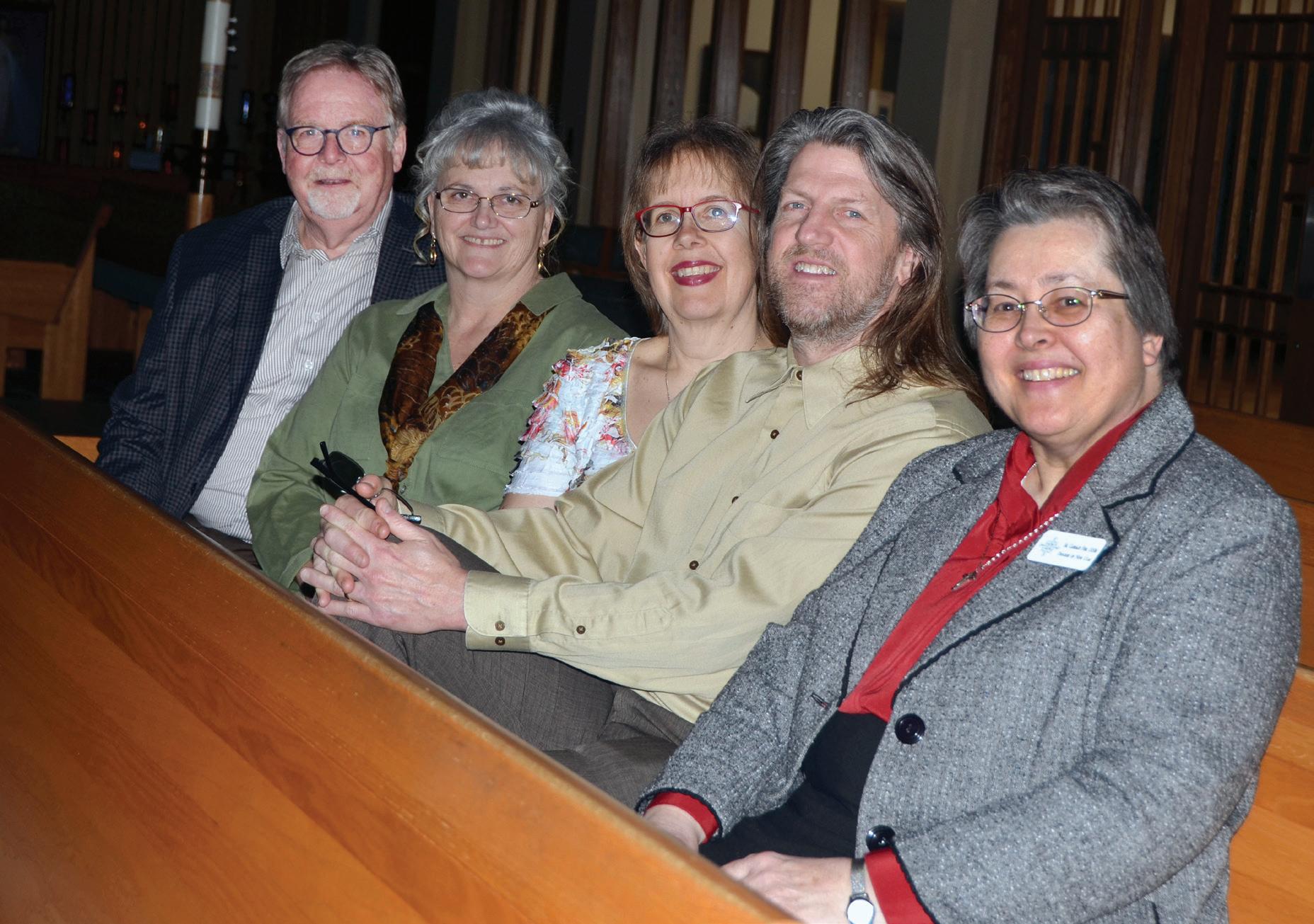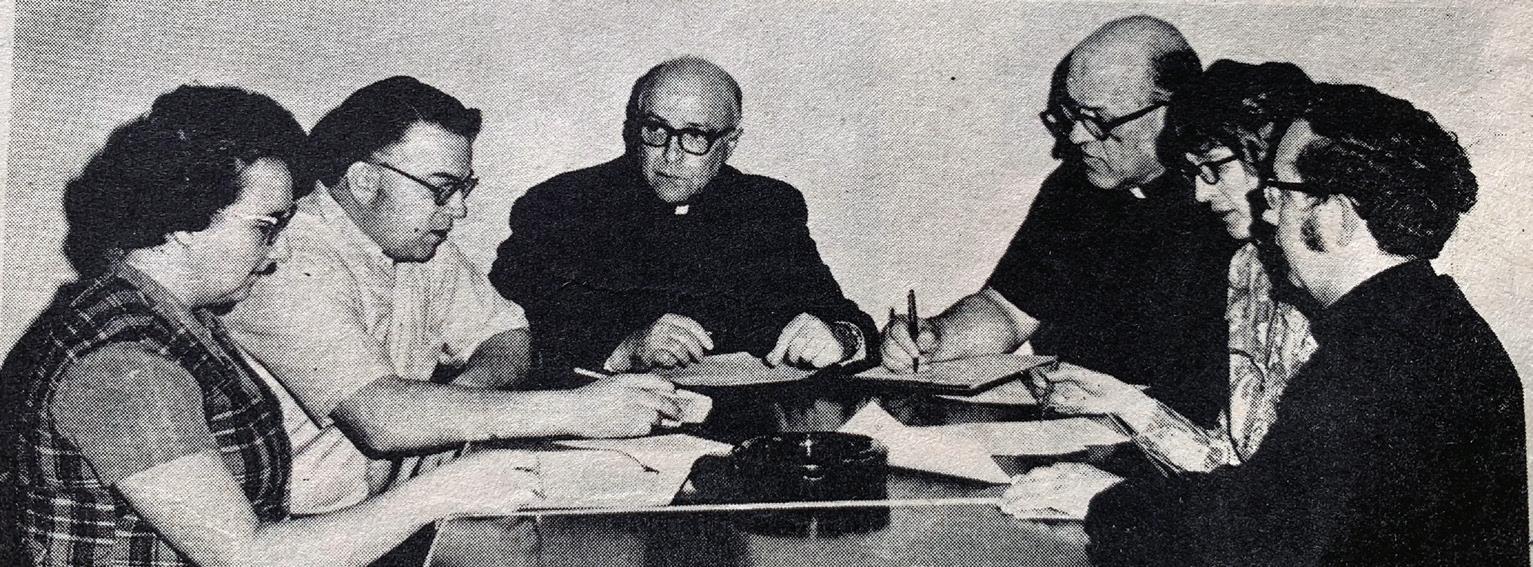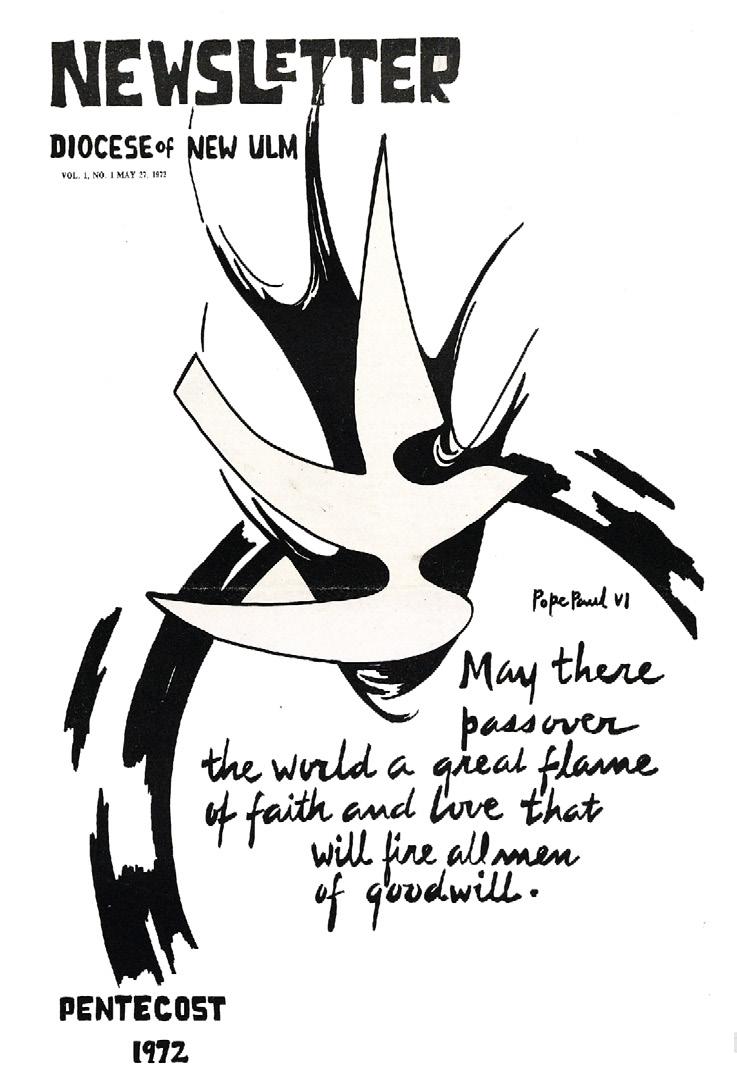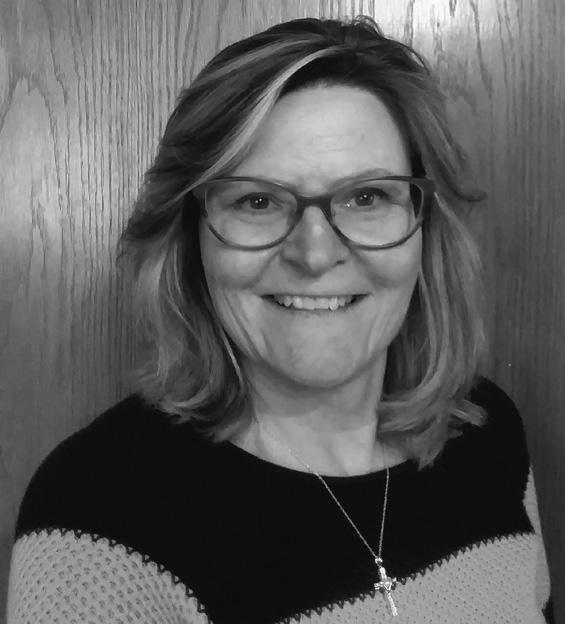
18 minute read
More on the diocesan Marriage Preparation Program
family life Diocese of New Ulm Marriage Preparation Program provides tools to build a strong and healthy marriage for engaged couples
by Katie Ballalatak Prairie Catholic correspondent
Advertisement
NEW ULM – Each year, the Diocese of New Ulm Office of Family Life conducts up to six Marriage Preparation Programs that allow engaged Catholic couples to study and understand the richness and beauty of the teachings of the Catholic Church on marriage and family. These one-day programs feature committed Catholic married couples who present on the topic of marriage. They bring these teachings to life through the sharing of their own experiences – all to help engaged couples prepare for the Sacrament of Marriage.
Roger and Deb Schroeder, parishioners of Holy Redeemer in Marshall, and Deacon Russ and Debbie Blaschko, parishioners of St. Peter in St. Peter, have served the diocese as marriage preparation presenters for 20 and 34 years, respectively. Both couples consider this opportunity a gift – one they genuinely love giving again and again to Catholic couples throughout the year. The Marriage Preparation Program focuses on six C’s. s Commitment unfolds marriage as a sacrament, a visible sign of God’s love, that is faithful, fruitful and forever. s Communication explores ways for couples to share themselves, their values, ideals, and hopes for their own relationship, their family and beyond. s Conflict resolution explores skills to restore harmony in relationships in a Christ-like and charitable manner. s Career and finance speaks of time, talent, and treasure and the sharing of those in the family, the Church, and the world. s Children and parenting highlights the relationship of family and how the couple is enriched through their use of natural family planning (NFP), as they seek to parent their children. s Church explores faith and spirituality in marriage, highlighting interfaith issues and the importance of prayer.
Sr. Candace Fier, ISSM, is the director of the Office of Family Life for the Diocese of New Ulm. She holds a masters degree in Marriage and Family and is also a nurse and a certified CrM FertilityCare practioner. Beyond coordinating the Marriage Preparation Program and its presenters, she spends considerable time collaborating with other diocesan Family Life offices throughout the state. “We as family life directors have ongoing conversations about how we think we can most effectively reach our couples today. What are the specific needs of our couples that are coming to us? How do we respond to the needs that society presents?”
As a result of these discussions, all Minnesota dioceses have a standard pre-marriage preparation program, and each meets the requirements needed to get married in the Catholic Church. This allows engaged couples to attend any of the pre-marriage programs in the state, should scheduling conflicts come into play.
“I think that’s been a real positive for us in the sense that it makes it much easier to serve our couples,” says Sr. Candace. Sr. Candace Fier (front), director of the diocesan Office of Family Life is pictured with her team of marriage preparation presenters (front-back) Roger and Deb Schroeder and Debbie and Deacon Russ Blaschko. (Photo by Christine Clancy)
Above all, Sr. Candace says it’s important for the diocese to provide engaged couples with good role models and support from couples living strong faith lives. “All of our presenters view their presentation as a gift to the future marriage of each couple. I encourage couples to take advantage of that – to take the time to ask questions and really be enriched by what those couples can give.”
Meet the Schroeders
Married for 28 years and the parents of seven children, Roger and Deb ultimately became involved in marriage ministry to give back to engaged couples in the Catholic Church. Twenty years later, their intention remains the same. “We believe so strongly in the sacrament of marriage,” said Roger. “We know the joys of being married and the importance of staying together, and we like helping where we can.”
Deb agrees: “We love having the opportunity to share our experiences and some of our own ups and downs of marriage with others so they can gain information that could potentially help them in their own marriages,” she said. During their years of marriage presenting, the Schroeders have primarily spoken on communication and conflict – topics they say they “fell” into but consider of the utmost importance. “Communication is just so key and so important in a marriage. It’s something we’ve worked hard to keep open in our own marriage,” said Deb.
In between presentations, Roger and Deb make themselves available and have had couples approach them to talk about addiction, family life, or specific questions they didn’t feel comfortable bringing to a larger group setting.
The Schroeders’ time spent in marriage ministry has helped build and strengthen their marriage as well: “Every time we are preparing to present, we see things from a different light which has just enriched our own marriage along the way,” said Deb.
When it comes to fostering a marriage after the wedding, Roger and Deb encourage couples to continue to dedicate time to the relationship, specifically through marriage retreats. “That time dedicated to your relationship is important. It might not always look like a retreat. But especially after kids and careers take over our lives, it’s so important to have dedicated time as a couple,” said Roger.
Meet the Blaschkos
Deacon Russ and Debbie, who will celebrate 40 years of marriage in September, started presenting in 1988.
At that time, the couple presented on finances and career due to Deacon Russ’ background in banking. Today, they continue to give the career talk, but also speak about children and natural family planning, something they really have a passion for “because it’s healthy, effective, and a gift,” said Deacon Russ.
When it comes to finances, the Blaschkos recommend and work with the couples through the idea of “family backgrounds” and how an individual’s family background may affect how a couple interacts with each other.
The common theme of sacramental grace weaves throughout the Blaschkos’ presentations. “We invite them to ask for the grace of matrimony. A marriage is not easy. You need the grace of matrimony to survive the long haul,” said Deacon Russ.
Like Roger and Deb, Deacon Russ and Debbie’s years in marriage ministry have also positively affected their family life. “I feel like this is the perpetual marriage class,” says Debbie. “Because we always have to go through our talks and update things, and then we’re forced to discuss things.”
For Deacon Russ, the experience of marriage ministry always reminds him that his children are constantly watching their marriage. “They have been learning by how we interact, how we embrace each other, how we solve our problems,” he said. “All married couples should live their lives knowing their children are going to imitate the way they worked through marriage. If I live my marriage with joy and hope and reconciliation, I can hope my children will observe that and will do the same.”
Editor's note: Couples interested in becoming a Marriage Program presenter should contact the Office of Family Life, cfier@dnu.org, (507) 233-5328.
education Extra! Extra! The Prairie Catholic celebrates 50 years of pastoral news
by Christine Clancy The Prairie Catholic
The year was 1972, and the first issue of NEWSLETTER rolled off the press!
Here’s the rest of the story. . .
On Nov. 18, 1957, the Diocese of New Ulm was established. Bishop Alphonse J. Schladweiler was appointed to shepherd the newly formed diocese. Up until 1972, the majority of the news about the new see was relayed to the diocesan faithful through a single-page information sheet maintained by a close association with The Catholic Bulletin, (renamed The Catholic Spirit in 1996), the newspaper of the Archdiocese of Saint Paul. (The archdiocese was renamed the Archdiocese of Saint Paul and Minneapolis in 1966). Early in his leadership, Bishop Schladweiler expressed his desire to have greater communication with pastoral leaders and the diocesan faithful he was entrusted to care for. Acting on the recommendation of the diocesan Liturgical Commission, the bishop gave his approval for a “news sheet” that would be mailed once a month, free of charge, to every registered Catholic household. It would include information about the activities of parishes and significant diocesan and parish events. After several years of planning by numerous clergy, religious, and laypersons, the first edition of the eight-page NEWSLETTER was printed on May 27, 1972. It was produced ten times per year, September through June, and was mailed to households of the nearly 70,000 registered Catholics in the 15 counties comprising the Diocese of New Ulm.
The newly formed newspaper’s production team included the editor, Fr. Donald Eichinger, who at the time was also serving as pastor of the Church of the Japanese Martyrs in Leavenworth, Margaret Knutson of Hutchinson, Bill McGarry of Appleton, Fr. Henry LeMay who was also serving as pastor of the Church of St. Andrew in Granite Falls, Lois Willette of Olivia, and Fr. Eugene Brown who was also serving as pastor of the Church of St. Leo in St. Leo.

The NEWSLETTER was the result of several years of planning by clergy, religious,
and lay people. The newspaper’s first editorial team included Margaret Knutson, (left), Bill McGarry, Fr. Donald Eichinger-editor, Fr. Henry LeMay, Lois Willette,
and Fr. Eugene Brown. (Photos from Prairie Catholic archives)
Newspaper a concerted effort.
Regional secular newspapers in the diocese pitched in to help with the production of the NEWSLETTER, which was being financially supported by the Diocesan United Fund, an annual parish assessment that helps support all of the ministries of the diocese.
For the first number of issues, A.J. Henle of the Lyon County Independent in Marshall, Minn. allowed the NEWSLETTER production team to use his company’s printing press. Mailing labels were provided by Dave Theisen of the Crow River Press in Hutchinson, Minn.
When the Marshall newspaper changed hands that same year, Fr. Eichinger arranged for the printing and addressing of mailing labels to be done by Mickelson Media of New Ulm. By the end of the first year, the entire printing of the NEWSLETTER was managed by the House of Print in Madelia, Minn. The Prairie Catholic continues to be printed in Madelia.
In his first pastoral letter published in the NEWSLETTER, Bishop Schladweiler expounded on the newspaper’s mission. He wrote: “Today, the diocese ventures into journalism. There has been a long period of expectation. Our priests and people have greatly desired this paper. I look upon it first of all as a reflection in print of our holy faith and of the Catholic way of life. Is there Above: Front page of NEWSLETTER’s
premiere issue on May 27, 1972. In
1986, the paper was renamed The Prairie Catholic.

a need for another publication in our midst? There is because this paper will be storied applications of our day-to-day Christian experiences. No other paper tells of this daily struggle and the triumphs and failures of the people of God in the Diocese of New Ulm.”
Newspaper gets a new name!
In 1975 Bishop Schladweiler’s request for retirement was accepted by Pope Paul VI,
(Continued on page 9.)
Pope Francis expresses ‘sorrow and shame’ for Catholic role in abuse against Indigenous peoples; meets Canadian Indigenous leaders at the Vatican
by Catholic News Agency
Editor’s note: On April 1, 2022, at the Vatican, Pope Francis made a historic apology to Indigenous peoples for the “deplorable” abuses they suffered in Canada’s Catholicrun residential schools and said he hoped to visit Canada in late July to deliver the apology in person to survivors of the Church’s misguided missionary zeal.
VATICAN CITY – Pope Francis has expressed his “sorrow and shame” for the role Catholics have played in the abuse of Indigenous peoples in Canada, especially in residential schools. During a meeting with representatives of the Métis, Inuit, and First Nations groups at the Vatican on April 1, the pope condemned colonization, saying he was sorry for the historic evil committed against Canadian Indigenous peoples. Pope Francis, who had private meetings with the Métis, Inuit, and First Nations delegations, said “listening to your voices, I was able to enter into and be deeply grieved by the stories of the suffering, hardship, discrimination and various forms of abuse that some of you experienced, particularly in the residential schools.” “It is chilling to think of determined efforts to instill a sense of inferiority, to rob people of their cultural identity, to sever their roots, and to consider all the personal and social effects that this continues to entail: unresolved traumas that have become intergenerational traumas,” he said. He condemned the colonization which broke the Indigenous peoples away from their native land and ways of life, stating that “in this way, great harm was done to your identity and your culture, many families were separated, and great numbers of children fell victim to these attempts to impose a uniformity based on the notion that progress occurs through ideological colonization, following programs devised in offices rather than the desire to respect the life of peoples.” The pope said that learning about these situations made him feel deep indignation and shame, “because it is not right to accept evil and, even worse, to grow accustomed to evil, as if it were an inevitable part of the historical process.” – for the role that a number of Catholics, particularly those with educational responsibilities, have had in all these things that wounded you, in the abuses you suffered and in the lack of respect shown for your identity, your culture and even your spiritual values,” he stated.
“All these things are contrary to the Gospel of Jesus Christ,” he underlined. “For the deplorable conduct of those members of the Catholic Church, I ask for God’s forgiveness and I want to say to you with all my heart: I am very sorry.” “Clearly, the content of the faith cannot be transmitted in a way contrary to the faith itself: Jesus taught us to welcome, love, serve and not judge; it is a frightening thing when, precisely in the name of the faith, counter-witness is rendered to the Gospel,” he added.
“It is my hope,” Francis continued, “that our meetings in these days will point out new paths to be pursued together, instill courage and strength, and lead to greater commitment on the local level. Any truly effective process of healing requires concrete actions. In a fraternal spirit, I encourage the Bishops and the Catholic community to continue taking steps towards the transparent search for truth and to foster healing and reconciliation.”
“I wish to tell you that the Church stands beside you and wants to continue journeying with you,” Pope Francis said.
A final farewell
New Council president installed at April convention

by Barb Mathiowetz former NUDCCW president This is my last article as the New Ulm Diocesan Council of Catholic Women (NUDCCW) president, a position I have held for two years. My term began at the end of April 2020, which was also the beginning of the COVID-19 pandemic. Back then, no one knew what the months ahead would entail for NUDCCW and like everyone else, we took it one day at a time. Those of us serving on the NUDCCW board continued to make plans for upcoming events, which often had to be canceled. We went from meeting in person to meeting via Zoom, which provided yet another new adventure for many of us board members. It was a presidency that provided many twists and turns (not unlike those who came before me), but it was definitely different. As I am writing this, final preparations are being made for the annual NUDCCW Convention, which will have taken place on April 30. I would like to thank the women of Holy Redeemer Catholic Church for all their hard work and dedication in the planning and hosting this day which they had initially planned for in 2020 and then re-planned for 2021 and planned again for 2022!
New president installed.
At the April convention, Jackie Finstad, a member of the Cathedral of the Holy Trinity in New Ulm, was installed as the new NUDCCW president. She has served on the NUDCCW Board as president-elect since last summer. (More about Finstad and the convention will appear in the June issue of The Prairie Catholic.)
Jackie is a warm and welcoming, faith-filled woman who will bring a fresh perspective that breathes new life into the Council of Catholic Women.
As I write these final words, I would like to thank all those in the Diocese of New Ulm who do so much through the DCCW.
I am inspired by your faith and the love you bring to our Church and communities. With a sincere and grateful heart, I say my final farewell as the president of NUDCCW. May God’s blessing be upon each one of you.
Newspaper a key instrument of evangelization
(Continued from page 8.)
and a new shepherd was named. Bishop Raymond A. Lucker was installed on Feb. 19, 1976, as the second bishop of the diocese.
Recognizing the growing interest and a need for improved communication with the people of the diocese, in 1979 Bishop Lucker formed the diocesan Office of Communications and appointed Fr. Dennis Labat to serve as part-time director while remaining associate pastor of the Church of St. Mary in Sleepy Eye and teaching at St. Mary’s High School. In 1984, Paula Marti was hired to serve as the first full-time director of the Office of Communications and assumed the newspaper editor responsibilities shortly thereafter. In 1986, NEWSLETTER readers were invited to participate in a “Name the Diocesan Newspaper” contest. The expectation of the contest was to find a name that would more clearly reflect what the diocese was – A people and a place in one of the most rural dioceses in the nation.

Out of the nearly 300 names submitted, Betty Heymans of Sleepy Eye won with her entry, The Prairie Catholic. The new masthead appeared in the September 1986 edition of the newspaper. From 1986 to 2017, The Prairie Catholic continued publishing ten times a year, September–June. In March of 2017, when the diocese filed for Chapter 11 Bankruptcy to manage legal expenses and facilitate settlements with clergy sexual abuse survivors, the Communications office was downsized to a staff of one, and the newspaper was reduced to seven issues published every six weeks (September-June). The diocesan newspaper continues to be financially supported by the Diocesan United Fund (DUF), in addition to donor contributions to the annual United States Conference of Catholic Bishops Catholic Communications Campaign, as well as an annual Home Missions Grant. The newspaper continues to be mailed free to all registered Catholic households in the diocese.
Valued teaching tool.
Throughout these past 50 years, the diocesan newspaper has been a valuable teaching tool that aims to assist the bishop and his diocesan staff, clergy, and parishes. It has remained a key instrument of evangelization and an essential presence in the life of the Diocese of New Ulm. For some in the diocese, the newspaper is their only means of Catholic education and spiritual formation.
Although e-newsletters, websites, social media, blogs, and email have become an essential part of any Church communications strategy, by the grace of God and the financial support from the faithful in the pews, the diocesan newspaper will continue to make an imprint in helping those in our parishes deepen their understanding of their Catholic faith and be a part of the life of the Church.
Editor’s note: Christine Clancy is editor of The Prairie Catholic. She has served the Diocese of New Ulm Office of Communications since 1987.
Newspaper archives now available
The Prairie Catholic and the NEWSLETTER are now available digitally through an online archive. Be sure to check out this great resource for documented voices, events, and Christian teachings that have shaped the Diocese of New Ulm for the past 50 years. Visit www.dnu.org - The Prairie Catholic
Easter - a time to encounter the Resurrection of our Risen Lord
When the risen Jesus encounters his disciples on the road to Emmaus, it is quite clear that their journeying away from Jerusalem is in fact a journeying away from hope.
They have witnessed their friend, their hoped-for savior die; they have seen their community scattered; they have understood their trust in God to have been misplaced. What is left for them now?
Jesus, of course, turns them around – quite literally. The encounter with the risen Christ means a renewed encounter with hope; that God is not done yet; that darkness and suffering do not have the final word.
Indeed, this story continues to unfold in our own time. We look out at a world wracked by hunger, poverty, war, injustice and we, too, feel like walking away. Where should we place our hope when the challenges seem insurmountable?
This is the story of resurrection. We encounter Christ daily in the faces of our neighbors, of those we meet in our work, our home, on our streets, those whom we have yet to meet face to face but with whom we are intricately tied as members of God’s one human family.
We encounter Christ, too, within ourselves. And in these encounters, we have reason to hope. Because God is not done yet – and so long as we have strength to continue the work of building a culture of encounter, of responding to our Gospel call, neither are we.
How are you called to join with others to “turn around” and challenge injustice that you see or experience?
How can you work with others to be a sign of Christ’s Resurrection in your community?
Editor’s note: This reflection was first published in CRS Rice Bowl’s Encounter Lent: Theological & Scriptural Reflections and appeared on WeAreSaltAndLight.org.
Summer Camps
tCamp Beloved - Girls’ Camp
July 23-25 (grades 6-8) July 26-29 (grades 9-12)
tCamp Greatness - Boys’ Camp
July 3-Aug. 1 (grades 6-8) Aug. 2-5 (grades 9-12)
Held at Schoenstatt-on-the-Lake in Sleepy Eye
Online registration is available through the diocesan Office of Youth & Young Adult Ministry, www.dnu.org/youth, or contact Kevin Losleben, director, klosleben@dnu.org, (507) 233-5327.




